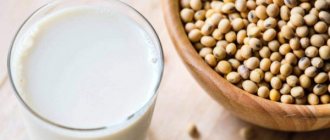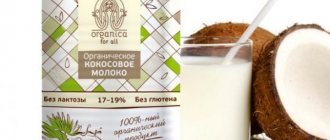Calorie content of milk
On average, the calorie content of milk is taken to be 55 kcal per 100 grams. Whole cow's milk contains 60 kcal, and country cow's milk contains 70 kcal. Natural homemade milk can contain 140 kcal. More accurately, calorie content is determined from the fat content of the product:
- In 6% – 84 kcal;
- In 4.5% – 72 kcal;
- In 3.2% – 58 kcal;
- In 2.5% – 52 kcal;
- In 1.5% – 44 kcal;
- In 1% – 41 kcal;
- At 0.5% – 35 kcal.
Milk, oh, contains 31 kilocalories.
Is it possible to drink warm or hot milk at night?
The answer to the question of whether it is possible to drink milk at night is simple - it is possible and even necessary. But you need to remember about individual intolerance and proper use of the drink.
For adults
Milk has a sedative effect on the nervous system. This means that in small quantities it can improve sleep quality and help with insomnia, migraines and headaches.
To get the maximum benefit from it, you should drink no more than one glass of warmed milk no earlier than two hours after dinner and no later than an hour and a half before bedtime. After this, it is recommended not to eat anything.
If you get carried away and overdo it with the quantity, then unpleasant consequences are possible: frequent urge to go to the toilet, bloating, colic and other unpleasant sensations.
For children
For children, milk at night is not only a natural, mild sedative, but also an invaluable source of nutrients. In addition, milk helps fight childhood colds.
In the absence of negative reactions to the product, it can be given to children without any problems two hours after dinner, but no later than an hour before bedtime. It is not recommended to drink it with a snack - cookies, nuts, dried fruits, sweets, as this negatively affects the functioning of the digestive system and the process of falling asleep.
Possible contraindications
Is it harmful to drink milk at night? Lactose intolerance – restriction of milk consumption at night. The volume of drink consumed determines the benefits and harms of milk at night. It is not recommended to drink more than 1 glass:
- liquid can cause swelling - caused by kidney dysfunction;
- milk sugar and proteins complicate detoxification in liver pathologies;
- you feel hungry in the morning: the dairy product increases blood sugar, especially in combination with honey;
- unpleasant symptoms appear - bloating, diarrhea, nausea - refrain from taking the product.
Benefits and harms of use
There are both positive and negative sides to using this product. It is worth considering them in more detail.
Benefits of milk:
- High content of calcium, protein, potassium, phosphorus and a whole group of vitamins - B, C, D, E, K;
- It calms the nervous system;
- It contains few calories;
- It is perfectly absorbed by the body.
But you need to remember about the dangers of milk:
- It can interfere with good sleep if there are problems with the gastrointestinal tract;
- Milk intolerance is one of the most common food allergies;
- With age, it is absorbed much less well; people over 40 years of age may develop intolerance to it;
- Older people may develop atherosclerosis;
- Milk contains a lot of calcium, but if you drink too much of it, it will begin to be washed out of the body and the bones will become brittle.
How to use it correctly
The main rule when drinking milk is to never drink it cold. This not only deprives it of its usefulness, but also harms the body. The fact is that milk is a fatty liquid. When it enters the stomach, it settles on the internal walls of the organs. This makes their work difficult and requires a lot of energy to clean the walls. In some cases, exacerbations of chronic diseases associated with the gastrointestinal tract are possible.
It is important! Iced milk can cause a cold or sore throat.
It is also not recommended to drink milk that is too hot. With strong heating, most of the beneficial substances are lost and can burn the mucous membranes.
For children
It is generally not recommended to give cow's milk to infants under one year of age. Starting from the age of one year, you can gradually accustom your child to dairy products. This should be done with the approval of your pediatrician and in small doses. For this purpose, special “baby” milk is selected. It is specially processed so as not to provoke allergic reactions and intestinal disorders and not to cause an overdose of calcium and phosphorus, potassium and other substances.
It is best to prefer children's fermented milk products: kefir, cottage cheese, yogurt. They are better absorbed by the child's body and cause fewer problems with allergies and intolerances.
Children are gradually introduced to milk: up to three years of age, it can be given warm, 2-3 tablespoons before bedtime. After three years, you can increase the daily amount to two glasses. After five years, only excess consumption of the product needs to be controlled. On average, a child needs no more than three glasses a day.
Pregnant and lactating women
For pregnant women, a nutritious and varied diet is the main guarantee of easy pregnancy and future health. If there are no contraindications, then the expectant mother should definitely include dairy and fermented milk products in her diet. They contain almost the entire range of substances necessary to maintain energy. It is best to use the product in various dishes - cereals, desserts, omelettes, drinks, but it is also useful to drink up to two glasses of warm milk during the day.
For nursing mothers the situation is more complicated. Newborn babies digest foreign protein very poorly, and this can lead to allergies and intolerances. On the other hand, for the woman herself it is a good source of easily digestible fats. You need to start with half to one glass of warmed milk per day. If after a week the child has not demonstrated any abnormalities in behavior or stool, then you can increase the portion by another half glass. It is best to add milk to dishes to minimize its potential allergenicity.
It is important! Pregnant and lactating women are recommended to drink fresh, non-perishable milk, preferably country milk.
When losing weight
When dieting, it is important not only to give up junk food and count calories. In order not to harm your health, you need to pay attention to vitamins, micro and macroelements, and “healthy” fats. Milk is an ideal source of calcium and protein, which the body needs during diets. The product also contains milk fats. They are well absorbed by the body, are not stored in extra pounds and are completely spent on maintaining activity.
One glass of warm milk is a good nutritious snack. You can drink it during the day between meals or an hour before bedtime to help you fall asleep faster and suppress headaches.
Many diets are based on the consumption of dairy and fermented milk products. Milk goes well with bananas, vegetables and herbs, cereals and spices. Do not mix it with sour fruits or drink in too large quantities - this will lead to flatulence, bloating and other unpleasant symptoms.
Is it possible to drink milk at night while on a diet?
The paleo trend is to blame for the exclusion of milk from most diets for weight loss. This is a group of diets that is aimed at simulating the diet of ancient man. Allegedly, our bodies have not changed at all during evolution, and we must eat and drink the same things as our ancient ancestors in order to remain slim and healthy. It is logical that the caveman had nowhere to get milk for the night, because farm animals did not live with him, there was no one to milk. So we had to chew the roots and gnaw on the bones of previously caught game.
Somehow you don’t want roots and bones? But it’s also better not to drink milk. Proponents of the trend explain it this way:
- an adult does not have enzymes responsible for digesting milk at all (unconfirmed information, or rather an advertising ploy; only people with lactose intolerance do not have enzymes. They have known about their problem since childhood, since gas formation and diarrhea do not cause them only milk, but also ice cream);
- milk is not absorbed in the body. Especially advanced comrades claim that it even accumulates in the body in the form of mucus. This is a free interpretation of one of the postulates of Ayurveda, and has nothing to do with the “paleo trend” or the true role of milk in the body. In reality, foods are either digested or cause indigestion and diarrhea, and then are partially digested;
- There is nothing healthy in milk. Proteins can be obtained from meat, poultry, fish, and eggs, and it is not at all necessary to do this with unnatural foods like milk or cottage cheese. Fats from milk are harmful, as they cause “cholesterol disease,” but carbohydrates are generally evil. More precisely, milk sugars are absorbed no slower than regular white sugar, which is simply terrible. More precisely, it increases the level of glucose in the blood quickly, and contributes to the feeling of hunger.
In general, all of the above arguments also have counterarguments.
What can be added for greater benefit?
Various spices and additives are often added to milk to enhance its positive properties.
Honey
Milk with honey is a source of many valuable vitamins and minerals. In addition, the drink has antibacterial properties, helping to treat infections and strengthen the immune system.
Preparing the drink is simple: take a tablespoon of honey for one glass of warm milk. Everything is thoroughly mixed and drunk an hour or two before bedtime.
It is important! You cannot boil milk and honey. As a result, it loses all its beneficial properties.
Turmeric
Milk with turmeric is an effective remedy for weight loss. The spice helps normalize metabolism and accelerates blood flow. To prepare the drink, take a glass of heated milk, half a teaspoon of turmeric and one teaspoon of honey. Everything is thoroughly mixed and drunk before bedtime.
Cinnamon
Milk with cinnamon has a good effect on the digestive organs, tones the body and has a beneficial effect on the nervous system.
To prepare the drink you will need a glass of warm milk and a little cinnamon - from one pinch to half a teaspoon. This milk will not only warm you up, but also help you calm down after a hard day.
Is it possible to drink milk at night if a person is healthy?
Classical dietology advises protecting yourself from “cholesterol disease” by consuming milk of moderate fat content. You don't have to drink something that resembles cream, and you shouldn't drink gallons of milk at all. A typical cup contains about a tenth of the normal amount of saturated fat. By the way, they are needed for the normal functioning of the nervous system and the secretion of sex hormones. So for some, a glass of milk can help maintain their health, especially if the rest of the diet is already “clean as hell”, and animal fats appear in it only on New Year’s and your own birthday.
With lactose intolerance, everything is also clear. It either exists or it doesn’t, and drinking milk does not cause any inflammation of the intestines. By the way, lactose intolerance is not a “Sentence”. Many people have success taking synthetic enzymes and continue to eat dairy products. Others choose lactose-free versions and are happy.
Regarding useful substances in products, the question is more philosophical than practical. There is absolutely one situation when a person has 6 strength training sessions a week and a fairly strict diet. Then a glass of milk won’t give him anything special, and it would be better to sprinkle some protein powder into it to at least meet the protein requirement. And it’s completely different when our hero (or rather heroine) weighs 48 kg, eats 1400 kcal, and is in a phase of permanent food exclusion. Then even milk will be much better than nothing.
Some people skip dinner and replace it with a glass of milk. This only works well if caloric expenditure is relatively low, other meals are "available", and the "milk dinner" does not make the diet too low in calories. The replacement does not work even if after such a dinner a person feels unbearably hungry after some time. This may not be due to the milk itself, but to the imbalance of the rest of the diet. Therefore, in each specific case it is necessary to observe and analyze, and not run around with “milk slogans” and give up habits thoughtlessly.
Should you personally drink or not? Depends on how exactly this glass “fits” into your menu. For many, it will, for example, deprive them of the pleasure of adding an extra 100 grams of low-fat protein to dinner. Here you have to choose between comfort and childhood habits.
In addition, drinking anything at night can lead to sleep disturbances. Some people cannot sleep peacefully if they have to get up to go to the toilet at night. This is not a deviation from the norm, but it causes a lot of problems, especially if you need to follow a certain training and nutrition regimen. So if milk prevents you from getting enough sleep, it’s better, of course, to give it up.
In theory, a glass of milk should promote sounder and healthier sleep. The drink contains the amino acid tryptophan, a natural “sedative” for humans.











